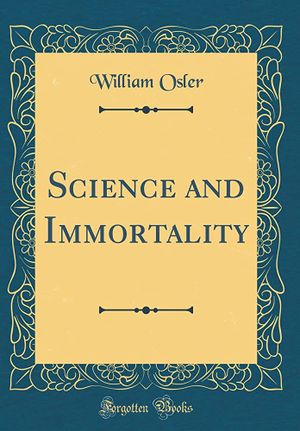Science and Immortality
Fiche technique
Auteur :
William OslerGenre : EssaiDate de publication (États-Unis) : 1904Langue d'origine : AnglaisÉditeurs :
Houghton Mifflin and Company, Constable & Co. LtdRésumé : Saturated with scholarly references to the sayings of poets, prophets, and philosophers, Osler provides a sweeping overview of his chosen subject, sharing a physician’s perspective on belief in immortality from three commonly assumed viewpoints. Most of us, Osler observes – like the lukewarm Christians of Laodicea – are practically indifferent to the question of personal immortality, and “the society set of the modern world… cares not a fig for the life to come.” Naturalists and investigators also “live wholly uninfluenced by a thought of the hereafter.” Like the Roman senator Gallio, (5BC – 65) – whose indifference towards religious disputes led him to dismiss Jewish accusations against St Paul the Apostle – the Gallionians “care for none of these things.” The last group, modelled on the example of St Teresa (1515-1582), were considered “the most interesting group of the three.” “Laden with fire” for their ideals, this “little flock of Teresians” have “in every age… kept alive this sentiment of immortality.” Described by Osler as “the moral leaven of humanity,” the Teresians “compel admiration and imitation by the character of the life they lead and the beneficence of the influence they exert.” Osler was most likely thinking of his own mother Ellen Picton (1806-1907) when he referred to the “heroic devotion” of “the beautiful life of some good woman [whose silent prayers] do more to keep alive among the Laodiceans a belief in immortality than all the preaching in the land.” Whilst the scientific revolution had transformed society “more effectively and more permanently than all the efforts of man in all preceding generations,” “of the things that are unseen science knows nothing, and has at present no means of knowing anything.” (The William Osler Society of Australia & New Zealand)

